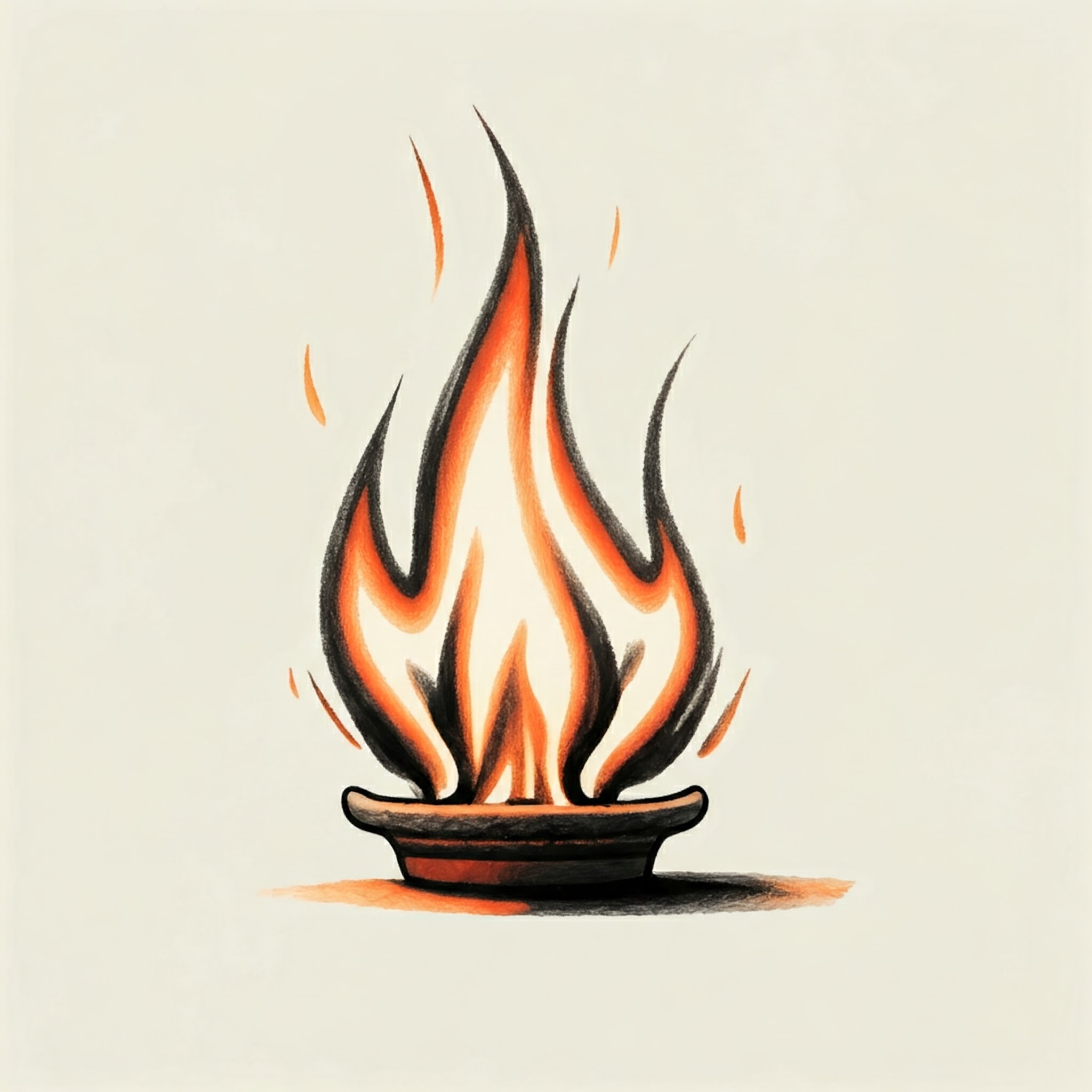Flame
Definition
Flame refers to the visible, gaseous part of a fire that emits light and heat. It can also metaphorically describe intense passion, emotion, or fervor. As a verb, it means to ignite or burn brightly, or in online communication, to attack someone with harsh or insulting language.
Parts of Speech
- Noun
- Verb
Pronunciation
American English
- IPA Pronunciation: /fleɪm/
- Respelling: FLAYM
British English
- IPA Pronunciation: /fleɪm/
- Respelling: FLAYM
Etymology
The word "flame" originates from the Latin term "flamma," meaning "flame" or "blaze." It entered Middle English through Old French "flambe," retaining its meanings related to fire and light.
Derivatives
- Flammable (adjective)
- Inflame (verb)
- Flaming (adjective)
- Flambeau (noun)
- Reflame (verb)
Synonyms
- Blaze
- Fire
- Passion
Antonyms
- Extinguish (verb form)
- Darkness
- None
Usage
The term "flame" is used to describe the physical phenomenon of fire ("The candle's flame flickered in the wind"). Metaphorically, it refers to strong emotions or passionate feelings ("Their love was a burning flame"). In internet contexts, it denotes hostile communication ("He was flamed in the comments section for his controversial opinion").
Related Terms
- Fire: The physical combustion phenomenon that produces flames.
- Spark: A small fiery particle or idea that initiates flames or passion.
- Heat: The thermal energy associated with flames or combustion.
Detailed Definitions
Noun
- The visible, gaseous part of a fire: Refers to the glowing or flickering light emitted during combustion.
- Example: "The campfire’s flame illuminated the dark forest."
- Intense passion or emotion: Metaphorically describes fervent feelings or enthusiasm.
- Example: "Her speech ignited a flame of inspiration in the audience."
- A person’s romantic partner or admirer: Informal usage often referring to a passionate relationship.
- Example: "She was his old flame from college."
Verb
- To burn with a bright flame: Describes the act of igniting or emitting fire.
- Example: "The torch flamed brightly in the dark cave."
- To attack someone harshly in written communication: Common in online forums or emails to describe hostile or critical messages.
- Example: "He was flamed for his unpopular comments on social media."
flame



🇨🇳 Mandarin
- 火焰 (Flame, as in fire)
- IPA: /xwǒ.jǎn/
- Respelling: huǒ yàn
- 爱火 (Flame, as in passion or ardor)
- IPA: /ài xwǒ/
- Respelling: ài huǒ
🇮🇳 Hindi
- लौ (Flame, as in fire)
- IPA: /ləʊ/
- Respelling: lau
- ज्वाला (Flame, as a blaze or fire)
- IPA: /d͡ʒʋaːlaː/
- Respelling: jwālā
🇪🇸 Spanish
- Llama (Flame, as in fire)
- IPA: /ˈʎama/
- Respelling: yama
- Pasión (Flame, as in passion)
- IPA: /paˈsion/
- Respelling: pa-sión
🇫🇷 French
- Flamme (Flame, as in fire)
- IPA: /flam/
- Respelling: flam
- Amour (Flame, as in a lover or passion)
- IPA: /a.muʁ/
- Respelling: a-mour
🇸🇦 Modern Standard Arabic
- شعلة (Flame, as in fire)
- IPA: /ʃaʕla/
- Respelling: sha'la
- الحب القديم (Old flame, as in a former lover)
- IPA: /alˈħubb alˈqadiːm/
- Respelling: al-hubb al-qadeem
🇧🇩 Bengali
- প্রদীপ (Flame, as in fire)
- IPA: /prod̪ip/
- Respelling: prodip
- জ্বলন্তিকা (Blaze, similar to flame)
- IPA: /d͡ʒʍolontika/
- Respelling: jwalontika
🇷🇺 Russian
- Пламя (Flame, as in fire)
- IPA: /ˈplamʲə/
- Respelling: plamya
- Искра (Spark, which can refer to a small flame or passion)
- IPA: /ˈiskrə/
- Respelling: iskra
🇵🇹 Portuguese
- Chama (Flame, as in fire)
- IPA: /ˈʃamɐ/
- Respelling: sha-ma
- Paixão (Flame, as in passion)
- IPA: /pajˈʃɐ̃w̃/
- Respelling: pai-shaun
🇮🇩 Indonesian
- Api (Flame, as in fire)
- IPA: /ˈapi/
- Respelling: a-pi
- Gairah (Passion or ardor, similar to flame in context)
- IPA: /ˈɡairaʔ/
- Respelling: gai-rah
🇩🇪 German
- Flamme (Flame, as in fire)
- IPA: /ˈflamə/
- Respelling: flah-me
- Liebschaft (Flame, as in a lover or passion)
- IPA: /ˈliːpʃaft/
- Respelling: lieb-schaft
🇯🇵 Japanese
- 炎 (Flame, as in fire)
- IPA: /ho̞nːo̞/
- Respelling: honō
- 恋人 (Lover, similar to flame in context)
- IPA: /ko̞ito̞/
- Respelling: koibito
🇻🇳 Vietnamese
- Ngọn lửa (Flame, as in fire)
- IPA: /ŋoŋ˧˥ luə˧˧/
- Respelling: ngọn lửa
- Đam mê (Passion, similar to flame in context)
- IPA: /ʐam˧˥ me˧˧/
- Respelling: đam mê
🇰🇷 Korean
- 불꽃 (Flame, as in fire)
- IPA: /bul̥k͈ot̚/
- Respelling: bul-kkot
- 연인 (Lover, similar to flame in context)
- IPA: /jʌ.nin/
- Respelling: yeon-in
🇹🇷 Turkish
- Alev (Flame, as in fire)
- IPA: /aˈlev/
- Respelling: a-lev
- Tutku (Passion, similar to flame in context)
- IPA: /ˈtutku/
- Respelling: tut-ku
🇵🇰 Urdu
- شعلہ (Flame, as in fire)
- IPA: /ʃoːlə/
- Respelling: shola
- عشق (Love or passion, similar to flame in context)
- IPA: /ʕɪʃq/
- Respelling: ishq





